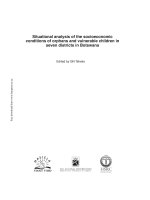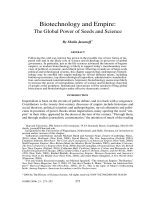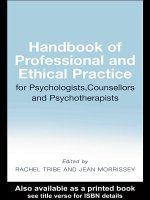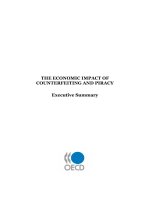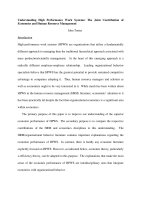The sage handbook of counselling and psychotherapy
Bạn đang xem bản rút gọn của tài liệu. Xem và tải ngay bản đầy đủ của tài liệu tại đây (8.59 MB, 1,300 trang )
The SAGE Handbook of Counselling and
Psychotherapy
The SAGE Handbook of Counselling and
Psychotherapy
4th edition
Edited by
Colin Feltham
Terry Hanley
Laura Anne Winter
SAGE Publications Ltd
1 Oliver’s Yard
55 City Road
London EC1Y 1SP
SAGE Publications Inc.
2455 Teller Road
Thousand Oaks, California 91320
SAGE Publications India Pvt Ltd
B 1/I 1 Mohan Cooperative Industrial Area
Mathura Road
New Delhi 110 044
SAGE Publications Asia-Pacific Pte Ltd
3 Church Street
#10-04 Samsung Hub
Singapore 049483
© Colin Feltham, Terry Hanley and Laura Anne Winter 2017
Chapter 1.1 © Colin Feltham and Terry Hanley 2017
Chapter 1.2 © Colin Feltham and Terry Hanley 2017
Chapter 1.3 © Laura Anne Winter and Terry Hanley 2017
Chapter 1.4 © Laura Anne Winter, Colin Feltham and Terry Hanley 2017
Chapter 2.1 © Laura Anne Winter 2017
Chapter 2.2 © Jenny Bimrose 2017
Chapter 2.3 © Simon Parritt 2017
Chapter 2.4 © Léonie Sugarman 2017
Chapter 2.5 © Liz Ballinger 2017
Chapter 2.6 © David Mair 2017
Chapter 2.7 © William West 2017
Chapter 2.8 © Doireann Mangan 2017
Chapter 3.1 © Laura Anne Winter 2017
Chapter 3.2 © William B. Stiles 2017
Chapter 3.3 © Biljana van Rijn 2017
Chapter 3.4 © Andrew Reeves 2017
Chapter 3.5 © Lucy Johnstone 2017
Chapter 3.6 © Julia Noble and Terry Hanley 2017
Chapter 3.7 © India Amos 2017
Chapter 3.8 © India Amos 2017
Chapter 3.9 © India Amos 2017
Chapter 4.1 © Laura Anne Winter 2017
Chapter 4.2 © Chris Rose 2017
Chapter 4.3 © Mary Creaner 2017
Chapter 4.4 © Antony Froggett 2017
Chapter 4.5 © Barbara Mitchels 2017
Chapter 4.6 © Tim Bond 2017
Chapter 4.7 © Tim Bond 2017
Chapter 4.8 © Colin Feltham 2017
Chapter 4.9 © Peter Jenkins 2017
Chapter 4.10 © Sobhi Girgis 2017
Chapter 4.11 © John McLeod 2017
Chapter 5.1 © Terry Hanley 2017
Chapter 5.2 © Anthea Millar 2017
Chapter 5.3 © Ruth Williams 2017
Chapter 5.4 © Mark Linington and Victoria Settle 2017
Chapter 5.5 © Lionel Bailly 2017
Chapter 5.6 © Jessica Yakeley 2017
Chapter 5.7 © Julia Segal 2017
Chapter 5.8 © Richard J. Brown, Sara Bardsley and Vanessa Herbert 2017
Chapter 5.9 © John Boorman, Eric Morris and Joe Oliver 2017
Chapter 5.10 © Jill Mytton and Heather Sequeira 2017
Chapter 5.11 © Sunil Lad and Chris Irons 2017
Chapter 5.12 © Michaela Swales and Christine Dunkley 2017
Chapter 5.13 © Catherine Kerr and Liz Royle 2017
Chapter 5.14 © Adam J. Scott and Kate Adam 2017
Chapter 5.15 © Windy Dryden 2017
Chapter 5.16© Nick Totton 2017
Chapter 5.17 © Ladislav Timulak 2017
Chapter 5.18 © Emmy van Deurzen 2017
Chapter 5.19 © Michael Ellis and Jonathan Smith 2017
Chapter 5.20 © Keith Tudor 2017
Chapter 5.21 © Clark Baim 2017
Chapter 5.22 © Helen Sieroda 2017
Chapter 5.23 © John McLeod 2017
Chapter 5.24 © Jo Cooper 2017
Chapter 5.25 © David Winter and Fay Fransella 2017
Chapter 5.26 © Guy Shennan 2017
Chapter 5.27 © Claire Pollitt 2017
Chapter 5.28 © Elizabeth Robinson and Graham Dyson 2017
Chapter 5.29 © Stephen Palmer 2017
Chapter 5.30 © John McLeod and Mick Cooper 2017
Chapter 5.31 © Konstantina Kolonia and Helen Kyritsi 2017
Chapter 5.32 © Val Wosket and Peter Jenkins 2017
Chapter 5.33 © Charlotte Sills and Keith Tudor 2017
Chapter 5.34 © Digby Tantam 2017
Chapter 5.35 © Colin Feltham 2017
Chapter 6.1 © Laura Anne Winter 2017
Chapter 6.2 © Richard Velleman 2017
Chapter 6.3 © Gill Donohoe and Tom Ricketts 2017
Chapter 6.4 © Linda Machin 2017
Chapter 6.5 © Denis O’Hara 2017
Chapter 6.6 © Andrew Guppy and Sally Woods 2017
Chapter 6.7 © Christiane Sanderson 2017
Chapter 6.8 © Caroline Vermes 2017
Chapter 6.9 © Jill Balmont and Ida Waksberg 2017
Chapter 6.10 © Christine Wilding 2017
Chapter 6.11 © Daniel Zahl 2017
Chapter 6.12 © Tom Ricketts and Gill Donohoe 2017
Chapter 6.13 © Julia Noble 2017
Chapter 6.14 © Tom Ricketts and Gill Donohoe 2017
Chapter 6.15 © Claudia Herbert 2017
Chapter 6.16 © Bernie Ryan 2017
Chapter 6.17 © Brian Martindale 2017
Chapter 6.18 © Gail Evans 2017
Chapter 6.19 © Rosaleen McElvaney 2017
Chapter 6.20 © Rowan Bayne 2017
Chapter 6.21 © Andrew Reeves 2017
Chapter 7.1 © Terry Hanley 2017
Chapter 7.2 © Nick Hodge and Anja Rutten 2017
Chapter 7.3 © Simon Parritt 2017
Chapter 7.4 © Liz Ballinger 2017
Chapter 7.5 © Olivier Cormier-Otano and Dominic Davies 2017
Chapter 7.6 © Emma Williamson 2017
Chapter 7.7 © Rachel Tribe and Anita Tunariu 2017
Chapter 7.8 © Jude Boyles 2017
Chapter 7.9 © Zsуfia Anna Utry and Stephen Palmer 2017
Chapter 7.10 © Andrew Reeves 2017
Chapter 7.11 © Elaine Kasket 2017
Chapter 7.12 © David Goss 2017
Chapter 7.13 © Gareth Williams 2017
Chapter 7.14 © Sarah Hovington and Zubeida Ali 2017
Chapter 7.15 © Alex Coren 2017
Chapter 7.16 © Kevin Friery 2017
Chapter 7.17 © Kathryn Geldard, David Geldard and Rebecca Yin Foo 2017
Chapter 7.18 © Kathryn Geldard, David Geldard and Rebecca Yin Foo 2017
Chapter 7.19 © Naoko Kishita and Ken Laidlaw 2017
Chapter 7.20 © Rudi Dallos 2017
Chapter 7.21 © Stephen Paul 2017
Chapter 7.22 © Gail Evans 2017
Chapter 7.23 © Maxine Rosenfield 2017
Chapter 7.24 © Kate Anthony 2017
Chapter 7.25 © Kate Anthony, Stephen Goss and DeeAnna Merz Nagel 2017
First edition published 2000. Reprinted 2002, 2003, 2004, 2005
Second edition published 2006. Reprinted 2007, 2009, 2010
Third edition published 2012. Reprinted 2014 (twice), 2015, 2016 (three
times)
This fourth edition published 2017
Apart from any fair dealing for the purposes of research or private study, or
criticism or review, as permitted under the Copyright, Designs and Patents
Act, 1988, this publication may be reproduced, stored or transmitted in any
form, or by any means, only with the prior permission in writing of the
publishers, or in the case of reprographic reproduction, in accordance with
the terms of licences issued by the Copyright Licensing Agency. Enquiries
concerning reproduction outside those terms should be sent to the publishers.
Library of Congress Control Number: 2017933985
British Library Cataloguing in Publication data
A catalogue record for this book is available from the British Library
ISBN 978-1-4739-5330-7
ISBN 978-1-4739-5331-4 (pbk)
Editor: Susannah Trefgarne
Editorial assistant: Talulah Hall
Production editor: Sushant Nailwal
Copyeditor: Sarah Bury
Proofreader: Sunrise Setting
Indexer: Elske Jannsen
Marketing manager: Michael Ainsley
Cover design: Sheila Tong
Typeset by: C&M Digitals (P) Ltd, Chennai, India
Printed in the UK
In memory of Moira Walker and David Geldard
Contents
List of Figures and Tables
About the Editors and Contributors
Preface to the Fourth Edition
Acknowledgements
PART I COUNSELLING AND PSYCHOTHERAPY IN
CONTEXT
1.1 What are counselling and psychotherapy?
1.2 What do people come to counselling and psychotherapy for?
1.3 What are the training routes in counselling and psychotherapy?
1.4 Where do counsellors and psychotherapists work?
PART II SOCIO-CULTURAL PERSPECTIVES
2.1 Introducing socio-cultural perspectives: social justice and
intersectionality
2.2 Gender
2.3 Disability
2.4 Age
2.5 Social class
2.6 Sexuality
2.7 Religion and spirituality
2.8 Race, culture and ethnicity
PART III THERAPEUTIC SKILLS AND CLINICAL PRACTICE
3.1 Introducing therapeutic skills and clinical practice: the ‘basics’
of therapeutic practice?
3.2 The client-therapist relationship
3.3 Assessment
3.4 Risk: assessment, exploration and mitigation
3.5 Formulation
3.6 Using outcome and process measures
3.7 Therapeutic beginnings
3.8 Therapeutic middles
3.9 Therapeutic endings
PART IV PROFESSIONAL ISSUES
4.1 Introducing professional issues: therapeutic skills ‘beyond
therapy’
4.2 Personal and Professional development
4.3 Clinical supervision
4.4 Leadership
4.5 Confidentiality, note taking and record keeping
4.6 Ethical codes and guidance
4.7 Responding to complaints
4.8 Client experiences
4.9 Therapy and the law
4.10 Mental health law
4.11 Fundamentals of research
PART V THEORY AND APPROACHES
5.1 Introducing theory and approaches: singular models, combined
approaches and alternative perspectives
5.2 Adlerian therapy
5.3 Jungian analytical psychology
5.4 Attachment-based psychoanalytic psychotherapy
5.5 Lacanian therapy
5.6 Psychoanalytic therapy
5.7 Psychodynamic psychotherapy
5.8 Psychodynamic interpersonal therapy
Cognitive-Behavioural Approaches
5.9 Acceptance and commitment therapy
5.10 Cognitive therapy
5.11 Compassion focused therapy
5.12 Dialectical behaviour therapy
5.13 Eye movement desensitisation and reprocessing (EMDR)
5.14 Mindfulness based cognitive therapy
5.15 Rational emotive behaviour therapy
Humanistic-Existential Approaches
5.16 Ecotherapy
5.17 Emotion-focused therapy
5.18 Existential therapy
5.19 Gestalt therapy
5.20 Person-centred therapy
5.21 Psychodrama
5.22 Psychosynthesis therapy
Constructivist Approaches
5.23 Narrative therapy
5.24 Neuro-linguistic programming
5.25 Personal construct counselling and psychotherapy
5.26 Solution-focused brief therapy
Integrative and Eclectic Approaches
5.27 Cognitive analytic therapy
5.28 Interpersonal psychotherapy
5.29 Multimodal therapy
5.30 Pluralistic therapy
5.31 Schema therapy
5.32 The skilled helper model
5.33 Transactional analysis
Alternative Approaches to Counselling and Psychotherapy
5.34 Psychopharmacology
5.35 Critical approaches to psychotherapy and counselling
PART VI CLIENT PRESENTING PROBLEMS
6.1 Introducing client presenting problems: a critical approach to
diagnosis and ‘psychopathology’
6.2 Alcohol problems
6.3 Anxiety and panic
6.4 Bereavement
6.5 Depression
6.6 Counselling for drug-related problems
6.7 Working with survivors of domestic violence
6.8 Eating disorders
6.9 HIV/AIDS
6.10 Low self-esteem
6.11 Medically unexplained symptoms (MUS)
6.12 Obsessive compulsive disorder
6.13 Personality disorders
6.14 Phobias
6.15 Post-traumatic stress disorder
6.16 Sexual violence: rape and sexual assault
6.17 The psychoses
6.18 Relationship and sex problems
6.19 Sexual abuse in childhood
6.20 Managing stress
6.21 Suicide and self-harm
PART VII THERAPEUTIC SPECIALISMS
7.1 Introducing therapeutic specialisms: continuing personal and
professional development
Diversity and Difference in Therapy
7.2 Counselling people labelled with Asperger Syndrome
7.3 Working with disability
7.4 Feminist therapy
7.5 Gender, sexuality and relationship diversity therapy
7.6 Working with homeless people
7.7 Working with interpreters
7.8 Working with refugees
Therapy Settings
7.9 Coaching
7.10 Working in further and higher education
7.11 Working with the media
7.12 Working with neuroscience and neuropsychology
7.13 Private practice
7.14 Working in primary care
7.15 Short-term therapy
7.16 Workplace therapy
Lifespan Issues
7.17 Counselling children
7.18 Counselling young people
7.19 Counselling older people
Therapeutic Modalities
7.20 Systemic family therapy
7.21 Group therapy
7.22 Relationship therapy
Technology and Therapy
7.23 Counselling by telephone
7.24 Electronically delivered text therapies
7.25 Wider uses of technology in therapy
Index
List of Figures and Tables
Figures
An abbreviated assessment form at Metanoia Counselling and
Psychotherapy Service (MCPS) 75
The Plan, Do, Study, Act cycle for measures 92
Some suggested dos and don’ts of using measures 93
Common measures 93
General time limits for legal matters 133
Tips on consulting codes and guidelines 139
Therapy and the law web resources 159
The Circle of Security™ 190
Core processes in acceptance and commitment therapy 221
Three system model 230
Compassion Circles: the key attributes of compassion (inner circle) and
the skills used to develop them (outer circle) 232
An example of dysfunctional reciprocal roles and procedures 321
Example of a partial SDR 323
Natalie’s structural profile 336
Natalie’s desired structural profile 337
Potential interaction of counsellor challenge and client realisation of
immediate, short-term and longer-term therapeutic goals within the
skilled helper model 353
Structural diagram of a personality 357
The cycle of change 382
Cognitive model of panic disorder 388
Cognitive model of generalised anxiety disorder 389
The interacting core grief reactions and coping responses in the RRL
model and the characteristics of the model reflected in the AAG scale
396
Levels of bereavement need associated with AAG vulnerability indicator
scores and the linked intervention 397
Therapeutic goals set within the framework of the RRL model 398
A simple guide to understanding eating disorder categorisation 422
Possible effects of negative thinking accompanying low self-esteem 434
Possible effects of positive thinking 435
Example of the downward arrow technique 438
A behavioural model of OCD 447
BACP professional values 568
A values-based approach to practice 568
Examples of values 569
An example of values and a personal mission statement 570
Yogic symbol of the heart 571
The proactive counselling process 600
The hot cross bun model for CBT 604
Timeline 605
Mapping of family and professional systems 613
Figure of eight pattern of interaction 627
Tables
Key historical developments 4
Sources of ethical guidance 138
Responding to the notification that a complaint or concern has been
received by a professional body 146
How to give evidence 147
The adjudicators’ decision-making process 147
ECHR articles 163
Five functions of dialectical behaviour therapy 237
John’s full modality profile (or BASIC ID chart) 334
Frequently used techniques in multimodal therapy and training 335
Types of psychopharmacological treatment 365
‘Normalizers’ by condition 365
Transmitters, drugs affecting them, their mode of action on the
transmitter, and side effects particularly relevant to participation in
psychotherapy 366
Criteria for a panic attack 386
Diagnostic features of generalised anxiety disorder 386
Applying the narrative process to the Range of Response to Loss model
399
Hannah’s combined quantitative and qualitative responses to the AAG
scale 400
Thinking like an optimist 438
Symptoms, syndromes and diagnoses that may be medically
unexplained 440
Examples of obsessional thoughts and linked behaviours 446
Epidemiological data for phobias 459
Factors associated with higher risk 500
Summary of differences for therapists between individual and group
therapy 617
Effective group therapy treatments 619
Yalom’s curative factors 620
About the Editors and Contributors
Colin Feltham
is Emeritus Professor of Critical Counselling Studies, Sheffield Hallam
University. He teaches counselling psychology at the University of
Southern Denmark and also runs experiential skills workshops in
Denmark. He speaks and examines at various UK universities as well as
internationally. His many publications include Counselling and
Counselling Psychology: A Critical Examination (PCCS Books, 2013),
Keeping Ourselves in the Dark (Nine-Banded Books, 2015) and
Depressive Realism (Routledge, 2017). In addition to counselling, the
topics he writes on include failure, humanistic psychology, evolutionary
psychology, anthropathology, and death.
Dr Terry Hanley,
CPsychol, AFBPsS, is the Programme Director for the Doctorate in
Counselling Psychology at the University of Manchester. He is a Fellow
of the Higher Education Academy, an Associate Fellow of the British
Psychological Society and was Editor of Counselling Psychology
Review between the years 2009 and 2015. He has a keen interest in
training therapists in research skills and is a co-author of Introducing
Counselling and Psychotherapy Research (Sage, 2013). Additionally,
his own therapeutic practice and research has primarily focused around
work with young people and young adults, a topic on which he is also
lead editor of the text Adolescent Counselling Psychology (Routledge,
2013). He is an HCPC-registered Counselling Psychologist and
presently works as a therapist with the organisation Freedom from
Torture providing psychological support to a football therapy project.
Follow him on twitter @drterryhanley.
Dr Laura Anne Winter,
CPsychol, is an HCPC-registered Counselling Psychologist and Lecturer
in Education and Counselling Psychology based at the University of
Manchester. Her research interests include social justice, and in
particular the impact of economic and relational inequality on wellbeing
and education. Previous research has included exploring social justice
within counselling and educational psychology, the impact of welfare
reform on families, and the way in which schools are supporting
emotional wellbeing in the context of austerity. Her clinical practice has
predominantly been based within NHS Primary Care settings, working
with individuals who have been diagnosed with ‘moderate’ and ‘severe’
‘mental health problems’.
Kate Adam,
BSc (Hons), PostGrad Dip, Reg. MBACP, MSc, Post MSc Dip,
CPsychol, AFBPsS, Reg. HCPC, RAPPS, is a Chartered Consultant
Counselling Psychologist, Applied Practice Supervisor and Associate
Fellow of the British Psychological Society. She works as the Head of
Psychology in a senior leadership position at ABL Health Ltd, a
community health-care provider and in private practice. Kate is
experienced in providing a range of clinical interventions, across the life
span in a variety of settings. Her specialist interests include: long-term
health conditions, eating disorders, personality disorders, psychological
trauma, supervision and service development. She has an active interest
in evidencing best practice and the application of models in therapy,
including positive psychology, behaviour change and mindfulness.
Zubeida Ali
is a BACP-accredited Counsellor and Professional Lead for Counselling
for a large IAPT service in the north of England. She held the post of
Chair of BACP’s Healthcare Division from 2012 until 2016, having
served on the Healthcare Executive for a number of years prior to this.
Zubeida also serves on the North West Psychological Professions
Network (NWPPN) Steering Committee and chairs the NWPPN
Counsellors Working in the NHS Network.
Dr India Amos
is a lecturer in Counselling and Psychotherapy at the University of
Salford and HCPC registered Counselling Psychologist. Her research
interests include qualitative research methodologies, particularly the
aesthetic dimension of qualitative description. India is particularly
interested in how we can engage individuals in an embodied way with
research findings to aid deeper empathic understanding of human
experience.
Dr Kate Anthony,
FBACP, is an expert in the field of technology in mental health. She is
CEO and co-founder of the Online Therapy Institute, a company
specialising in training mental health and coaching practitioners to use
technological tools in their services. She is a Fellow of the British
Association for Counselling and Psychotherapy (BACP), awarded for
her outstanding services to the profession, and Past-President and
Fellow of the International Society for Mental Health Online (ISMHO).
Lionel Bailly
is a Practising Analyst of the Association Lacanienne Internationale
(Paris) and an Academic Associate of the British Psychoanalytical
Society. He is Honorary Senior Lecturer at University College London
Psychoanalysis Unit where he is particularly involved in the doctoral
school. He trained in medicine and psychiatry at the Salpêtrière Hospital
in Paris and before moving to the UK was head of the Child and
Adolescent Bio-Psychopathology Unit of the Henri Rouselle Centre at
St Anne Hospital (Paris). He is the author of Lacan in the Beginner’s
Guide Series (One World Press, 2009).
Clark Baim
is a Senior Trainer in Psychodrama Psychotherapy and the Co-Director
of the Birmingham Institute for Psychodrama, Birmingham, England.
From 2000 to 2012, he was the Co-Lead National Trainer for the
Probation Service’s Sexual Offending Groupwork Programmes in
England and Wales. In 1987 he established and was the Founder
Director of Geese Theatre UK, a company focusing on rehabilitative
work in criminal justice. In 2007 he received the David Kipper Scholar’s
Award from the American Society of Group Psychotherapy and
Psychodrama.
Liz Ballinger
is a BACP Senior Accredited Counsellor. She is a lecturer at the
University of Manchester. She acts as Programme Director for the MA
in Counselling, alongside supervising doctorate and masters students’
research and providing input on the counselling and educational
psychology doctorate programmes. Her doctoral thesis focused on
tutors’ experience of counsellor training. Her belief in the importance of
the social context in the shaping of human experience has led her to an
ongoing critique of therapy, and a related interest in the relationship of
both gender and social class to therapeutic processes and outcomes.
Jill Balmont
has worked as a Chartered Clinical Psychologist in the NHS for over 30
years. She specialises in the field of HIV and sexual health for both
Nottinghamshire and Derbyshire Healthcare NHS Foundation Trusts,
and she has regularly taught on the Doctorate in Clinical Psychology
Course at Hull University. She is grateful to Dr Janet Garley, Consultant
in Genito-urinary Medicine, for her comments on the medical aspects of
her chapter.
Dr Sara Bardsley
qualified as a Clinical Psychologist in 2016 from the University of
Manchester, having completed specialist training in Psychodynamic
Interpersonal Therapy.
Rowan Bayne
is Emeritus Professor of Psychology and Counselling at the University
of East London where he was a core tutor on the postgraduate diploma
in counselling and psychotherapy for 32 years. His recent books include:
Psychology for Social Work Theory and Practice (with Paula Nicolson,
Palgrave Macmillan, 4th ed., 2014); Applied Psychology: Research,
Training and Practice (edited with Gordon Jinks, Sage, 2nd ed., 2013);
and The Counsellor’s Guide to Personality: Understanding Preferences,
Motives and Life Stories (Palgrave Macmillan, 2013).
Professor Jenny Bimrose,
based at the Institute for Employment Research, University of Warwick,
has over 30 years of experience teaching at postgraduate level in
counselling, researching and managing in higher education. Many of her
research projects have focused on the theory and practice of counselling
and on the career development of women. International comparative
research into older women’s career progression across nine countries, on
which Jenny led, was recently completed and published.
Tim Bond
is an Emeritus Professor at the University of Bristol and a Visiting
Professor to the University of Malta and a registered member of BACP.
He researches and writes about ethical and legal issues for the talking
therapies and is a consultant to BACP on the Ethical Framework for the
Counselling Professions.
John Boorman,
DClinPsych, is a Clinical Psychologist for South London and Maudsley
NHS Trust and Co-director of Greenheart Psychological Services, an
ACT and contextual-based therapy provider. He is also Visiting Lecturer
in the University of Hertfordshire’s Clinical Psychology Department.
John regularly delivers Acceptance and Commitment Therapy (ACT)
training for a range of National Health Service, University and private
organisations. He is currently on the committee board for the British
Association of Behavioural and Cognitive Psychotherapies (BABCP)
ACT Special Interest Group, which promotes the dissemination and
training of ACT throughout the UK. His research interests include using
ACT and contextual behavioural approaches with children, young
people and their families.
Jude Boyles
iis a BACP Senior Accredited Psychological Therapist. She has been
practising as a Therapist for the last 24 years. Prior to qualifying, Jude
worked in a Rape Crisis centre and in Women’s Aid refuges. Jude
qualified as a therapist and worked in a Mental Health Crisis service for
11 years before establishing the Freedom from Torture Centre in
Manchester in 2003. Jude managed the centre for 14 years, and carried a
caseload of torture survivors during that time. Jude starts a new role in
August 2017 as a Psychological Therapist with Syrians resettled to the
UK via the Syrian Vulnerable Persons Resettlement Programme.
Dr Richard J. Brown
is Senior Lecturer in Clinical Psychology and Programme Director for
the Clinical Psychology Doctorate at the University of Manchester. He
is also Honorary Consultant Clinical Psychologist with Greater
Manchester Mental Health NHS Foundation Trust where he runs the
Functional Neurological Disorders (FuND) Service. He delivers therapy,
training and supervision in Psychodynamic Interpersonal Therapy (PIT),
co-developed PIT skills training for Psychological Wellbeing
Practitioners and co-authored the PIT treatment manual for psychogenic
non-epileptic seizures. He is a founding member of the Psychodynamic
Interpersonal Therapy Special Interest Group UK.
Jo Cooper
has been involved with NLP since the 1980s and was certified by
Richard Bandler as a master trainer in the mid-1990s. She was a partner
in an NLP training company for 10 years and now works as a freelance
trainer and consultant. She has a private practice in which much of her
work is with equestrians, specialising in confidence coaching,
performance enhancement and trauma recovery. She has a special
interest in working systemically with the mind–body system which is
especially relevant when working with sports people.
Mick Cooper
is a Professor of Counselling Psychology at the University of
Roehampton and a Chartered Counselling Psychologist. Mick is author
and editor of a range of texts on person-centred, existential, and
relational approaches to therapy, including Existential Therapies (Sage,
2nd ed., 2017), Working at Relational Depth in Counselling and
Psychotherapy (with Dave Mearns, Sage, 2005), and Pluralistic
Counselling and Psychotherapy (with John McLeod, Sage, 2011). Mick
has also led a range of research studies exploring the process and
outcomes of humanistic counselling with young people. Mick’s latest
book is Existential Psychotherapy and Counselling: Contributions to a
Pluralistic Practice (Sage, 2015).
Alex Coren
initially trained as a psychiatric social worker working in both adult
mental health and in child and family guidance clinics. After training as
a psychoanalytic psychotherapist he worked as a psychotherapist in a
variety of clinical settings and contexts, including both secondary and
tertiary education, predominantly at King’s College London and Oxford
University. He was Director of Psychodynamic Studies in the
Department for Continuing Education at Oxford University and has
written extensively in the field of education and short-term therapy. His
books include A Psychodynamic Approach to Education (Sheldon Press,
1997) and Short-term Psychotherapy (Palgrave, 2010).
Olivier Cormier-Otaño
is a BACP-accredited counsellor, a psychosexual therapist and a
supervisor in private practice for over 10 years. He volunteered for over
five years for LGBT charities as an assessor and a counsellor. He
practises in English, French and Spanish, and has a particular interest in
the intersections of language, cultures and narratives in therapy and has
run a therapeutic group for Gay male asylum seekers and refugees.
Olivier facilitates various training events and teaches on various
diplomas for Pink Therapy, the Centre for Psychosexual Health (CPH),
Beeleaf Institute and independently. Olivier has contributed to articles
and presented in conferences on the subject of asexuality.
Dr Mary Creaner
is Course Director for the MSc Clinical Supervision, and Assistant
Professor with the Doctorate in Counselling Psychology, Trinity College
Dublin. She is an accredited therapist/supervisor with the Irish
Association for Counselling and Psychotherapy, a member of the
American Psychological Association and also acts as a supervision
consultant and trainer to statutory and voluntary agencies. Among her
publications is the book, Getting the Best out of Supervision in
Counselling and Therapy (Sage, 2014) and she was guest editor for a
special section on ‘Current trends in clinical supervision’ (2014) with
the Counselling Psychology Quarterly journal.
Rudi Dallos
is Professor and Research Director on the Doctorate in Clinical
Psychology training programme in Plymouth University, UK. He has
worked as a family therapist in a variety of contexts for over 35 years
with a specialism in work with children and adolescents. He has recently
developed a programme of attachment and family therapy intervention
(SAFE) for families with a child diagnosed with autism which has
gained research funding. He has published several books, including: An
Introduction to Family Therapy (4th ed., Open University Press, 2010),
Systemic Therapy and Attachment Narratives, (Routledge, 2009) and
Formulation in Psychotherapy and Counselling (Taylor and Francis,
2006).
Dominic Davies
is the Founder and CEO of Pink Therapy (www.pinktherapy.com). He is
a Fellow of the British Association for Counselling and Psychotherapy
and the National Counselling Society. He is a Senior Accredited
Psychotherapist with the National Council of Psychotherapists and a
member of the World Professional Association for Transgender Health.
Dominic is co-editor (with Charles Neal) of the Pink Therapy trilogy,
which were the first British textbooks for therapists working with
lesbian, gay, bisexual and transgender clients. He works as a therapist,
supervisor, mentor and international training consultant on gender
sexuality and relationship diversity issues.
Gill Donohoe
is a clinical lead for cognitive behavioural psychotherapy within the
Improving Access to Psychological Therapies Service (Sheffield IAPT),
Sheffield Health & Social Care NHS Foundation Trust. She is a trained
mental health nurse and a BABCP-accredited clinician, supervisor and
trainer. Gill helped to establish and teach on the Postgraduate Diploma
in High Intensity Psychological Interventions at the University of
Sheffield from 2008 to 2016. Her interests include large group
psychological interventions, mindfulness-based cognitive group therapy
and self-practice and self-reflection (SPSR). She is current chair of
Yorkshire BABCP branch.
Windy Dryden
is Emeritus Professor of Psychotherapeutic Studies at Goldsmiths
University of London, and is a Fellow of the British Psychological
Society. He has authored or edited more than 220 books and edits 20
book series in the area of counselling and psychotherapy. His major
interests are in rational emotive behavior therapy and CBT; single
session interventions; the interface between counselling and coaching;
pluralism in counselling and psychotherapy; writing short, accessible
self-help books for the general public; and demonstrating therapy live in
front of an audience.
Dr Christine Dunkley
is a Consultant Psychotherapist with 30 years’ NHS experience, first as
a medical social worker and then as a BACP senior accredited therapist.
As a Senior Trainer with the British Isles Dialectical Behaviour Therapy
training team, she helps clinicians implement the therapy in the UK and
internationally through training events, site visits and regular
consultations. She has published widely on DBT, mindfulness,
emotional pain and supervision. She is an honorary lecturer for Bangor
University and has consulted on a large NHS trial on DBT at the
University of Southampton. She co-founded the Society for DBT in
2012.
Graham Dyson,
PhD, DClinPsy, is an HCPC-registered Clinical Psychologist currently
working in a Health Psychology setting. He has recently worked in the
area of psychological trauma within independent practice and also as a
Senior Lecturer on the Doctorate in Clinical Psychology programme at
Teesside University, where he was responsible for recruitment and
personal professional development. He worked as a Clinical
Psychologist in the National Health Service for six years post
qualification, primarily with adults in a low security setting. He
completed his Interpersonal Therapy training in 2005 and has since been
engaged in teaching and supervision within the Durham and Teesside


